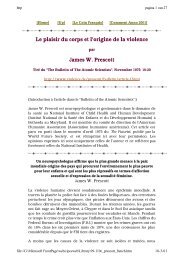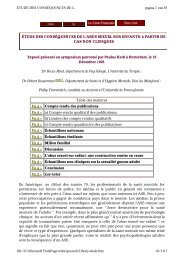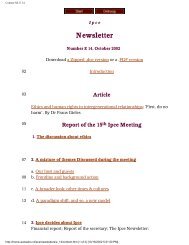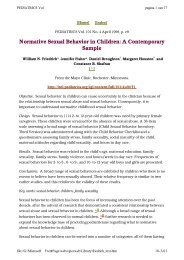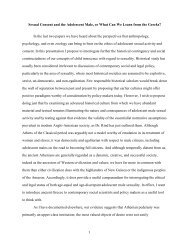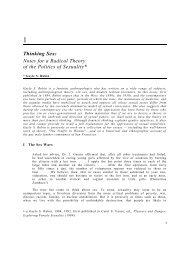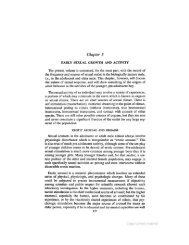Infant and Child Sexuality: A Sociological Perspective - Ipce
Infant and Child Sexuality: A Sociological Perspective - Ipce
Infant and Child Sexuality: A Sociological Perspective - Ipce
Create successful ePaper yourself
Turn your PDF publications into a flip-book with our unique Google optimized e-Paper software.
cide that the child is “not old enough to know about such things yet”<br />
(postponed response). Even in regard to animal sexual behavior “that<br />
day never did come.”<br />
When I helped my father in the barn, I often saw<br />
the afterbirth from the cows in the gutter when<br />
we were cleaning the barn. I quite naturally was<br />
curious as to what the afterbirth was <strong>and</strong> asked<br />
dad what it was. He told me that I was not old<br />
enough to know about such things yet, but that<br />
he would tell me when I was older. However, that<br />
day never did come.<br />
Not one parent in the Sears (Sears, et al, 1957) study was found to<br />
be completely free <strong>and</strong> open in the discussion of sex with young children.<br />
One reason why parents are not open in sex discussion is the fear<br />
that any attention called to the subject may awaken the child to erotic<br />
activity--“he’s one of those guys who would go out <strong>and</strong> try it.” (Sears,<br />
Maccoby, <strong>and</strong> Levin, 1957, p. 192).<br />
The average child of five or six who has not been openly <strong>and</strong> positively<br />
socialized about sexual matters <strong>and</strong> who has had an opportunity<br />
to observe genital differences can say that “girls have shorter ones<br />
<strong>and</strong> boys have longer ones” or that “a boy’s sticks out <strong>and</strong> a girl’s<br />
doesn’t.” But he is very reluctant to divulge the name or label by<br />
which he knows the organ. The name he knows for the organ may be as innocuous<br />
as the term “dewdrop,” “teddy bear,” “dicky bird,” “train,” or<br />
“pieces of string.” Nevertheless, the child becomes restless, bites his<br />
lip, or hangs his head <strong>and</strong> refuses to speak when he is requested to utter<br />
the word which refers to that part of the body. Conn <strong>and</strong> Kanner<br />
(1947) reported no less than sixty-one different names for the sex organs<br />
in the vocabularies of two hundred children. But they were most<br />
reluctant to use them. Many had two or three terms for the sex organs<br />
which they could use interchangeably. Most of these terms served both<br />
for the male <strong>and</strong> the female genitals. The great majority of children<br />
had something to say about how bad, naughty, “not nice” it was to talk<br />
about genitality, genitals, to see others undressed, <strong>and</strong> to be seen in<br />
the nude. Sex talk was generally regarded as a great offense. This attitude<br />
was especially strong when it came to naming the genitals. A<br />
girl six years old said, “that’s a bad word.” When she was asked why,<br />
she said “because it’s really bad.” A five year old boy said “a girl<br />
has a different thing. I don’t want to say it because it might be a bad<br />
word.”<br />
This phenomenon of non-labeling or mislabeling the sex organs <strong>and</strong><br />
their functions, encouraged by many parents, leaves the child without a<br />
vocabulary with which to think properly or to describe human physical<br />
attributes <strong>and</strong> his own physical or psychic experiences. Because he<br />
lacks a definitive sexual vocabulary, it is possible that fantasy will<br />
overrun his sex life. The mysterious penis that supposedly exists behind<br />
the female pubic hair, the feeling that females have been castrated,<br />
<strong>and</strong> other childhood fantasies are possible because there is no<br />
system of naming of parts <strong>and</strong> functions which guides the child’s nascent<br />
interest in his own or other’s bodies. (Gagnon, 1965).<br />
When child <strong>and</strong> parent do not share an adequate vocabulary for un-<br />
60



